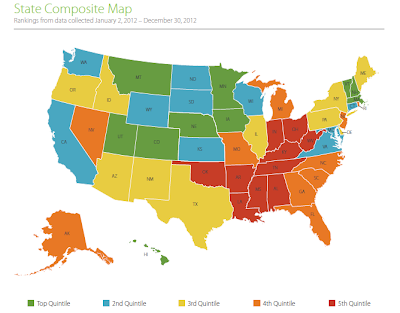 |
| Photo courtesy of Gallup-Healthways |
This isn't the first time some of these states have been called out for their low well-being scores, though. West Virginia has taken last place in terms of well-being for four out of the five years this report has been conducted. Ohio and Indiana have also taken up permanent residence as the 42nd and 44th saddest states, respectively, for the last two years with both states' well-being scores slowly decreasing since 2008.
Each "sadness state" can be found in a tiny cluster located in the South and Midwest parts of the United States, all touching one another but also surrounded by states with middle of the line well-being scores. So, what about these states makes them sad, and why do they all happen to be all clumped together?
While some may place fault on the Great Recession as to why these states have such an overabundance of sadness, Lindsay Sears, a Healthways researcher, said the sadness comes more from unhealthy behaviors sometimes due to access problems than from affects of the recession.
 |
| Photo courtesy of howaltmcdowell.ignitewellness.com |
What I found to be most surprising, and what I think causes these states to have such low levels of well-being, was the fact that residents reported in the survey that they did not have access to certain basic necessities. While the report did not go into specifics about what necessities these residents were referring to, I can only presume that the lack of healthy behaviors stemmed from a lack of access to means to promote those healthy behaviors.
Louisianans had the third lowest score for basic access to necessities, and only 75 percent of residents reported having health care. This goes for all the 10 states on the lower end of the well-being report.
I can throw out as many tips and as much advice as humanly possible about how to stop smoking, how to exercise more, how to choose healthy eating options, but the tips and advice do not resonate if readers don't have access to what I'm referring to.
 |
| Photo courtesy of bootsuite.com |
So whether you take up residence in Alabama or Hawaii, take a moment to see what you might be able to do in your own community to spur change in another state or another community. By spreading the well-being mentality, or by trying to implement a program or opportunity, you can work to curb the Sadness Belt from spreading - or from even staying put for that matter! Think about what's helped you the most on your well-being journey, and try to find a way to spread and share that with others no matter whether they live in the Sadness Belt or not - I think we could all use a bit more well-being ...
No comments:
Post a Comment